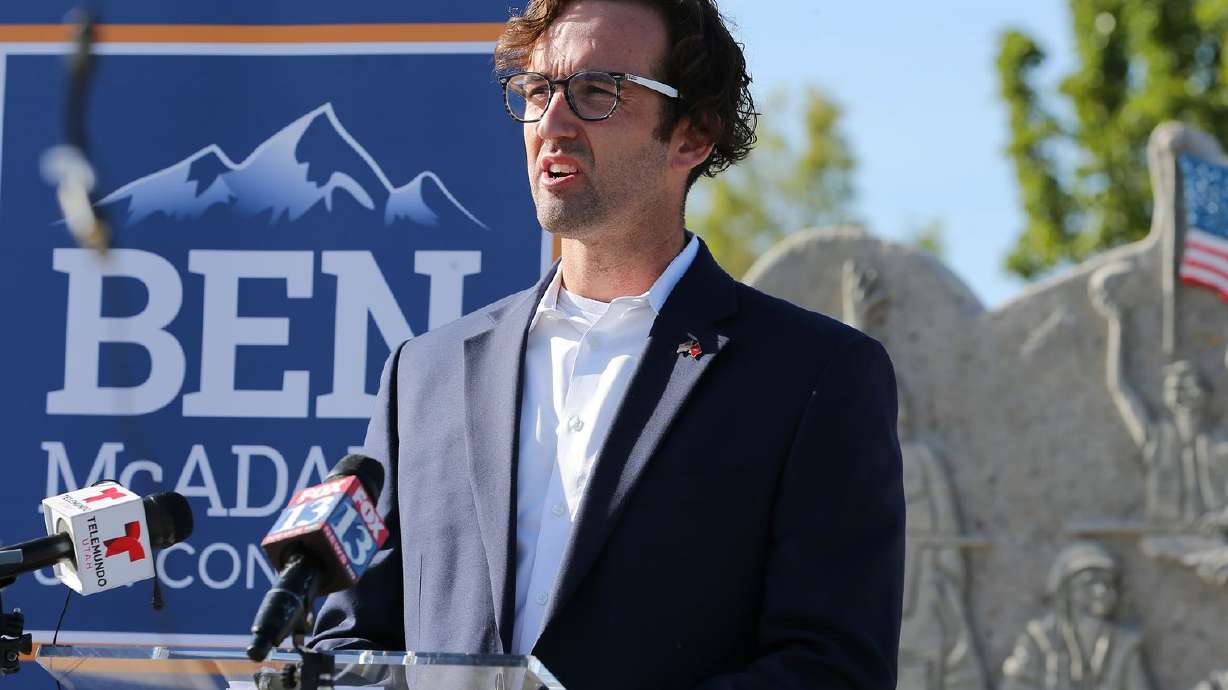Estimated read time: 4-5 minutes
This archived news story is available only for your personal, non-commercial use. Information in the story may be outdated or superseded by additional information. Reading or replaying the story in its archived form does not constitute a republication of the story.
WEST JORDAN — Veteran Chris Goehner said he’s “not who you would think would have suicidal thoughts or attempts.” But on Monday, Goehner shared his struggles to help promote a bill requiring research into the effect of high altitudes on veteran suicide.
‘What people don’t see is I have two deployments to Iraq under my belt,” said Goehner, who is finishing his second master’s degree at the University of Utah, including seven months where, as an anesthesia technician, he saw service members die on the operating table from combat injuries.
“Coming home, I had survivor’s guilt. I was trying to figure out, why do I deserve to live when these service members died fighting for their country? I struggled. On May 4, 2006, just two months after returning home from my second deployment, I wanted to commit suicide,” he said.
But he got help, and was medically discharged from active duty that October. Still, Goehner said his suicidal thoughts remained. A week before being honored in 2012 by former President George W. Bush for being wounded in the global war on terror, Goehner said he “had a gun in my hand, ready to commit suicide.”
After moving to Salt Lake City two years ago and completing his first master’s degree, he said he once again felt suicidal and checked himself into the Veterans Medical Center “because I wanted to kill myself. I didn’t understand why I deserved to live.”
While the VA and other organizations are providing support, Goehner said more needs to be known about risk factors such as living at high altitude, the subject of Rep. Ben McAdams’ bill that’s part of a package of veterans’ legislation expected to be signed by President Donald Trump as soon as this week.
The need for understanding the impact of high altitudes is acute, Goehner said, because he is “more at risk of dying here from suicide than I would have been deployed,” as are other service members. He said he has lost more friends and fellow service members to suicide since returning from Iraq than during both of his deployments.
McAdams, who held a news conference Monday with Goehner and others in front of the military services monument in West Jordan’s Veterans Memorial Park, said many service members struggle with mental health issues after they return home and “tragically, far too many of our veterans die by suicide. We must do everything we can.”
He said the suicide rate for veterans is one and half times higher than for those who did not serve.
“That is unacceptable. It can be prevented,” McAdams said.
He said his work on other suicide prevention legislation, including an effort to increase the number of mental health professionals, led him to research connecting high altitudes to increased suicide rates.
Given that Utahns live at higher elevations than much of the rest of the country, the congressman said “for Utah veterans in particular, it’s important to dive in and study this possible connection.” He said his bill directs the VA to conduct a study and then use its findings “to develop life-saving tools that will prevent veteran suicide.”

Perry Renshaw, a University of Utah psychiatry professor and the first researcher to recognize the connection, said “some important progress” is being made. The Rocky Mountain region has been viewed as a suicide belt for half a century, he said.
“If you live in or at elevated altitude, you will have an increased rate of suicide and, in fact, probably a markedly increased rate of suicide. Because the higher you go, the more suicide there is,” Renshaw said, an effect that is “much stronger” among veterans.
Deborah Yurgelun-Todd, director of the Mental Illness Research Education Clinical Center at the Salt Lake City VA, said the legislation “will enable us to take forward some work that has really not been carried out to its fullest potential yet,” especially the neurobiological, or brain-based changes related to suicide.
Also at the news conference was veterans advocate Terry Schow, the retired director of the Utah Department of Veterans Affairs. Schow said he greatly appreciates the effort to study the effects of high altitude on veteran suicides.
McAdams, who won the 4th Congressional District seat in 2018 by defeating two-term Republican Rep. Mia Love, faces one of the nation’s most competitive House races against former NFL player, author and frequent Fox News guest Burgess Owens.
Owens, who bested three other Republicans to secure his party’s nomination in the June 30 primary, trailed McAdams by 4 percentage points, 41% to 45%, in the most recent Deseret News/Hinckley Institute of Politics poll. The poll found 11% of likely voters in the district that includes parts of Salt Lake and Utah counties are undecided.
Suicide prevention resources
If you or someone you know is struggling with thoughts of suicide, call the suicide prevention hotline at 1-800-273-TALK.
Crisis Hotlines
- National Suicide Prevention Lifeline: 1-800-273-TALK (8255)
- Statewide/Salt Lake County Crisis Line: 801-587-3000
- Utah County Crisis Line: 801-691-5433
- Wasatch Mental Health Crisis Line: 801-373-7393
- Trevor Project Hotline for LGBTQ teens: 1-866-488-7386
Online Resources
- NAMI Utah: namiut.org
- County Crisis Lines: https://www.namiut.org/families-caregivers/suicide-prevention
- Utah Chapter-American Foundation for Suicide Prevention: afsp.org/chapter/utah
- Suicide Prevention Lifeline: www.suicidepreventionlifeline.org










